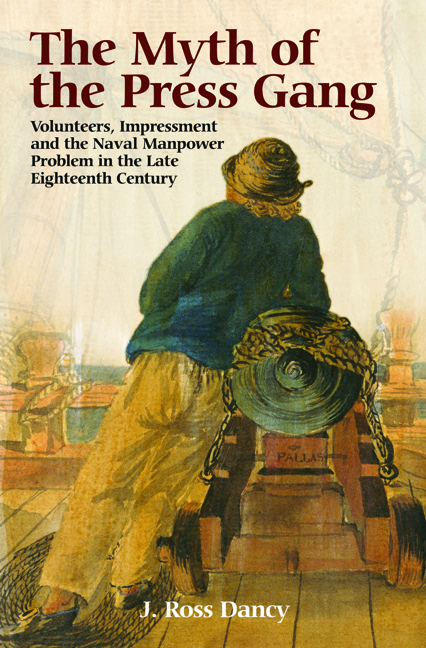 The Myth of the Press Gang
The Myth of the Press Gang 3 - Volunteers
Published online by Cambridge University Press: 05 May 2015
Summary
Your fleet and your trade have so near a relation, and such a mutual influence upon each other they cannot be well separated; your trade is the mother and nurse of your seamen; your seamen are the life of your fleet, and your fleet is the security and protection of your trade, and both together are the wealth, strength, security and glory of Britain.
Military volunteering during the French Revolutionary and Napoleonic Wars was likely the greatest popular movement in Georgian Britain. Though Lord Haversham's quote from the House of Lords is in reference to the strength of the Royal Navy at the beginning of the eighteenth century, he took the opportunity to specifically mention seamen as the ‘life’ of the fleet. For the Royal Navy, seamen were of vital importance for success at sea, and as no formal system of naval training existed, the vast majority of those men gained their experience from merchant seafaring. This ensured, as Henry Dundas wrote in 1800, that ‘the present strength and pre-eminence of this country is owing to the extent of its resources arising from its commerce and its naval power which are inseparably connected’. The skills required by navy seamen were virtually identical to those of merchant seamen. There was no way to tell one from another; there was no distinctiveness between a merchant sailor and naval seamen. They were simply seamen, who at a given point worked for one employer or another, whether it be the King's service or a merchant. Without a large supply of such men, any naval force was disadvantaged. The most severe limitation on every navy was manpower, as it limited the number of ships that could be put into service, even when the ability to construct and support larger numbers of ships existed.
Volunteers were the basic source of manpower for the Navy, just as they were for the Army. 8 These men formed the first and fundamental means of naval manning.
- Type
- Chapter
- Information
- The Myth of the Press GangVolunteers, Impressment and the Naval Manpower Problem in the Late Eighteenth Century, pp. 56 - 119Publisher: Boydell & BrewerPrint publication year: 2015
